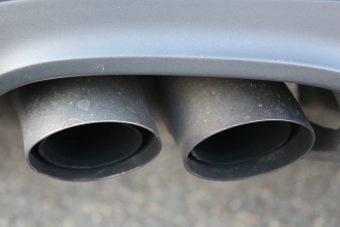
Modern diesel cars produce 10 times more toxic air pollution than heavy trucks and buses, new European data has revealed.
The stark difference in emissions of nitrogen oxides (NOx) is due to the much stricter testing applied to large vehicles in the EU, according to the researchers behind a new report. They say the same strict measures must be applied to cars.
NOx pollution is responsible for tens of thousands of early deaths across Europe, with the UK suffering a particularly high toll. Much of the pollution is produced by diesel cars, which on the road emit about six times more than allowed in the official lab-based tests. Following the Volkswagen “dieselgate” scandal, the car tests are due to be toughened, but campaigners say the reforms do not go far enough.
The new report from the International Council on Clean Transportation (ICCT), a research group that played a key role in exposing Volkswagen’s cheating, compared the emissions from trucks and buses in realistic driving conditions with those of cars.
It found that heavy-duty vehicles tested in Germany and Finland emitted about 210mg NOx per kilometre driven, less than half the 500mg/km pumped out by modern diesel cars that meet the highest “Euro 6” standard. However, the buses and trucks have larger engines and burn more diesel per kilometre, meaning that cars produce 10 times more NOx per litre of fuel.
The ICCT analysis showed that manufacturers were able to ensure that heavy duty vehicles kept below pollution limits when on the road, but that emissions from cars soar once in the real world.
Official EU tests for cars are currently limited to laboratory measurements of prototype vehicles. “In contrast, for measurement of NOx emissions from trucks and buses, mobile testing devices became mandatory in 2013. As a consequence, randomly selected vehicles can be tested under real-world driving conditions,” said Peter Mock, managing director of ICCT in Europe.
Changes to the car testing regime in the EU are due to start in September, with mobile devices, called portable emissions measurement systems (PEMS), attached to vehicles as they drive on real roads.
But Mock warned: “Manufacturers will still be allowed to carefully select special prototype cars for emissions testing. Instead, it would be much better to measure the emissions of ordinary mass-production vehicles, obtained from customers who have had been driving them in an ordinary way.”
Such a system is used in the US where the dieselgate scandal first emerged. It will also be put forward for discussion by the European commission on 17 January in Brussels, but the ICCT said it faces resistance from some vehicle manufacturers and EU member states.
In December, the European commission started legal action against the UK and six other EU states for failing to act against car emissions cheating in the wake of the dieselgate scandal. But later the same month, a draft European parliament inquiry found the European commission itself guilty of maladministration for failing to act quickly enough on evidence that defeat devices were being used to game emissions tests.
Evidence that some diesel cars emitted up to four times more NOx pollution than a bus was revealed in 2015. Catherine Bearder, a Liberal Democrat MEP and a lead negotiator on the EU’s air quality law, said “It is disgraceful that car manufacturers have failed to reduce deadly emissions when the technology to do so is affordable and readily available. The dramatic reduction in NOx emissions from heavier vehicles is a result of far stricter EU tests, in place since 2011, that reflect real-world driving conditions. If buses and trucks can comply with these limits, there’s no reason cars can’t as well.”
Source: theguardian.com



